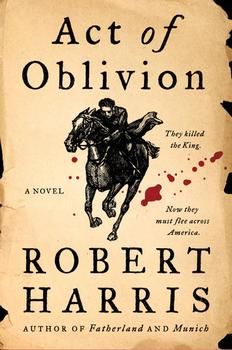Summary | Excerpt | Reviews | Beyond the Book | Readalikes | Genres & Themes | Author Bio

A Novel
by Robert Harris
He remembered everything about that midwinter day – slipping out of Essex House at first light, the bitter wind off the Thames, hurrying along the Strand, past the big mansions that backed onto the river, the feel of his old army knife and pistol hidden beneath his coat. It was all unreal to him. To cut off the head of an anointed king? Impossible. Barbarous. A sacrilege. The army would never go through with it. Either General Fairfax, the Parliamentary commander, would put a stop to it, or the thousands of Royalists lying low in the city would rise up to prevent it. He for one was ready if the word was given to sacrifice his life to rescue his sovereign.
Then he had turned at Charing Cross towards Whitehall and his hopes had collapsed. The crowd in King Street was certainly large enough – five or six hundred – to cause trouble. But the number of troops was greater, a thousand or more: lines of pikemen shoulder to shoulder, holding people back, then cavalry packing the middle of the wide thoroughfare to prevent any attempt to reach the scaffold. The makeshift timber platform, draped in black, adjoined the side of the Banqueting House. There was no ladder from the street. It was accessible only from an upper window. An organised mind, a military mind, had thought this all out very carefully.
He pushed his way through the mob. There was none of the holiday atmosphere that usually attended an execution. Even the most radical republicans, the Levellers, recognisable by the sea-green ribbons attached to their coats and hats, were keeping their mouths shut for once. He worked his way down the back of the silent crowd, along the wall separating Whitehall from the Tilt Yard. People were standing on it for a better view, or sitting perched, legs dangling. He saw a gap, demanded to be allowed up, and when no one moved, he grabbed the nearest man by his feet and threatened to pull him down unless he made room. He had the physique of a wrestler. They shifted along.
Standing on the parapet, he had a good view over the heads of the crowd and the soldiers. The scaffold was about thirty yards away. Most of the windows of the Banqueting House were boarded up, but one on the first floor gave access to the platform. From time to time an officer would step out and patrol around it, scan the scene, then retreat out of the cold, shutting the window behind him. There were five small objects in the centre of the platform, and it took Nayler a while to work out their purpose. One was a very low wooden chopping block, barely higher than a man's hand, with iron hoops on either side of it and two more set close together a little further back. Clearly the intention, if the King put up a struggle or tried to rouse the crowd, would be to tie him down by his hands and feet and cut off his head while he was lying prone. Thorough staff work again. Barbarous.
The day did not get warmer. No sun tempered the iron frost, just the occasional flurry of snow and a grey sky so heavy it seemed to press all the colour from the buildings. Time itself felt frozen. Nayler had to keep his hands in his pockets and shuffle from foot to foot to ward off the numbness. Eventually, half a mile to the south, the abbey bell tolled nine o'clock. The old wound in his thigh ached like a knife jabbed in the bone. His mind became as blank as the sky; there was only the pain in his leg and the cold and the dread. Another hour passed. He counted the chimes of ten o'clock, and then not long afterwards he heard a faint drumbeat coming from somewhere behind him, from St James's Park: a slow funereal pulse. After a few minutes, the beat ceased.
He looked to his right, to the Holbein Gate. Above its arch an enclosed passageway led across the street to the Banqueting House. Figures appeared behind the mullioned windows: soldiers first, followed by a shorter man with a familiar profile who turned briefly to look down at the crowd and the scaffold, then a pair of clergymen, and finally more soldiers. In the instant of recognition, all the air seemed to go from Nayler's body. A moment later, the procession vanished. But others had seen it too, and the word went round: 'He's here!'
Excerpted from Act of Oblivion by Robert Harris. Copyright © 2022 by Robert Harris. Excerpted by permission of Harper. All rights reserved. No part of this excerpt may be reproduced or reprinted without permission in writing from the publisher.
Your guide toexceptional books
BookBrowse seeks out and recommends the best in contemporary fiction and nonfiction—books that not only engage and entertain but also deepen our understanding of ourselves and the world around us.